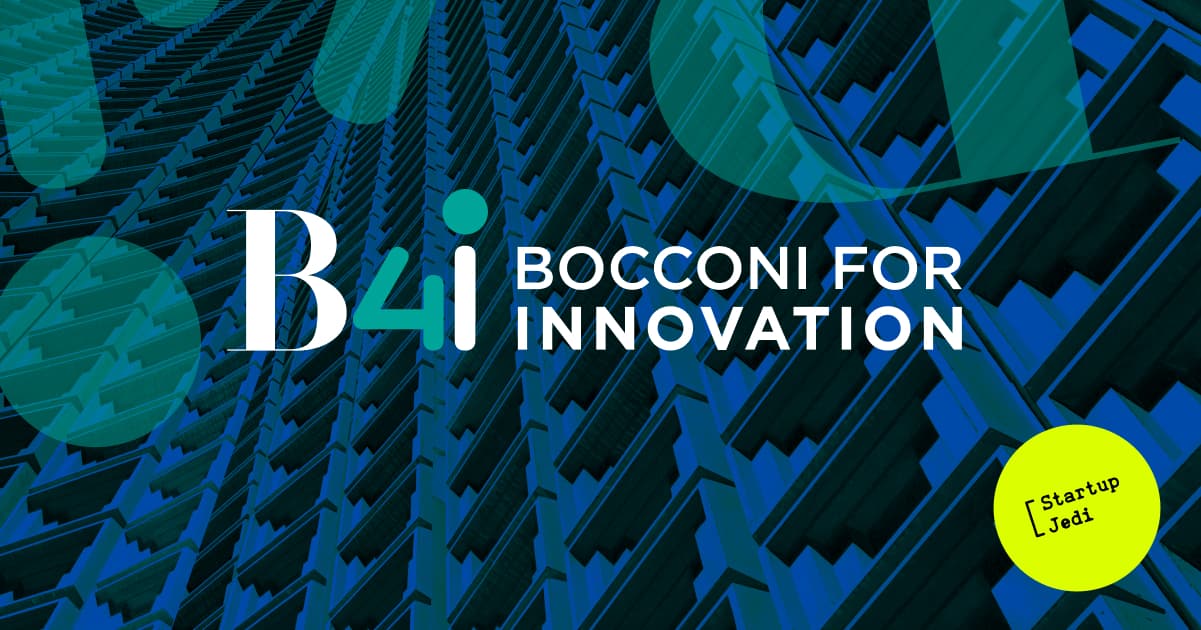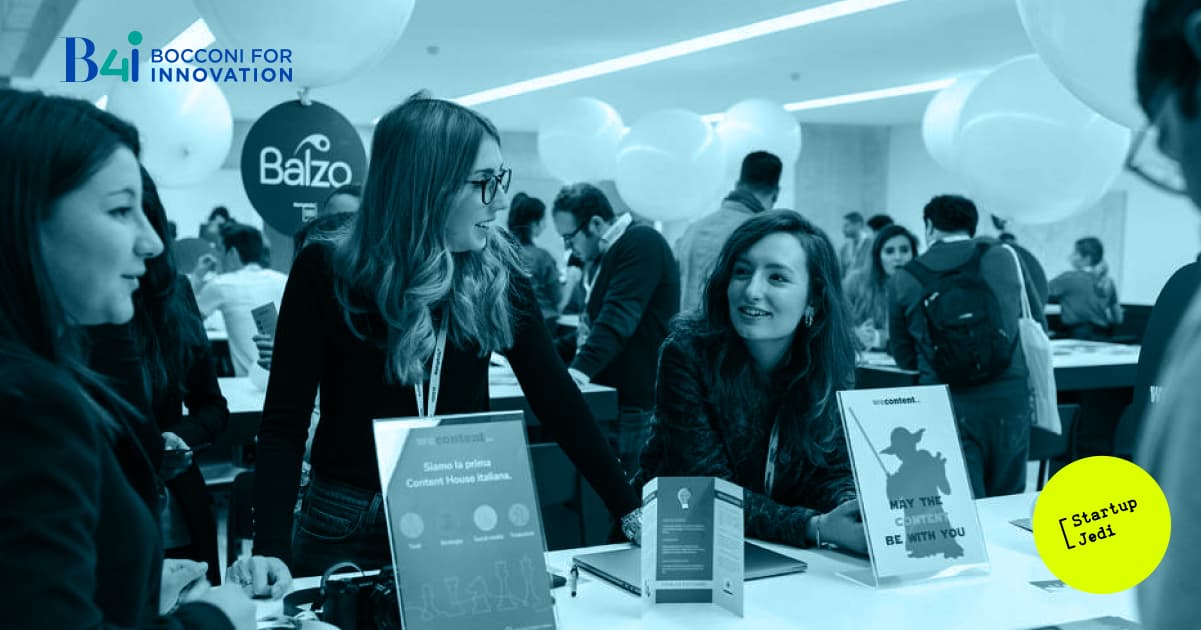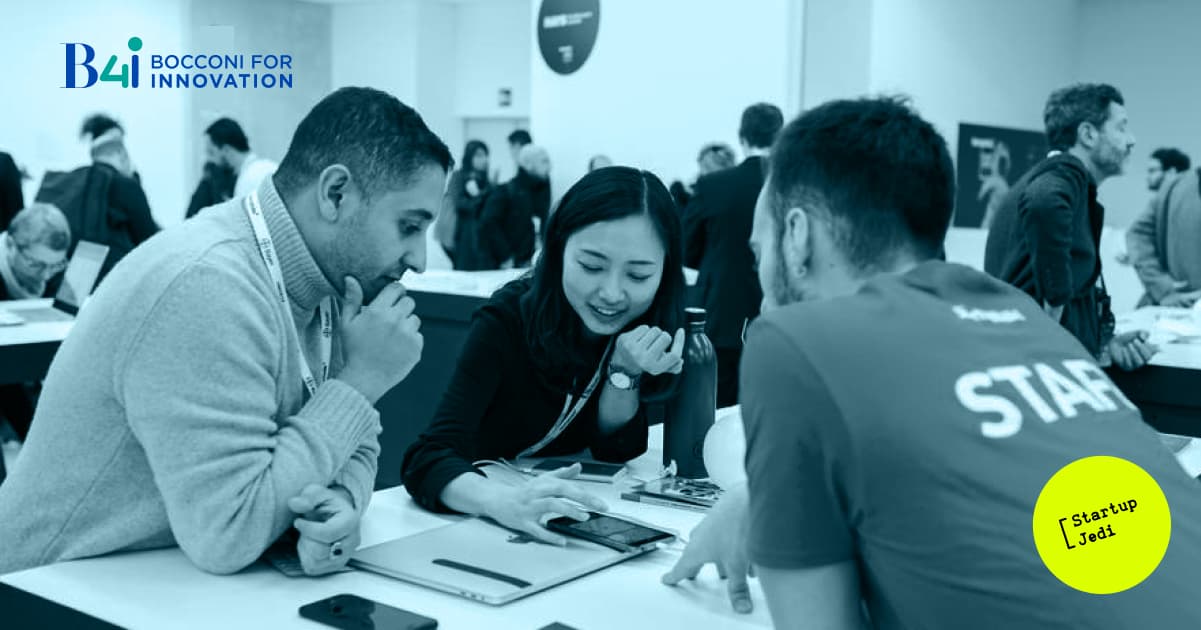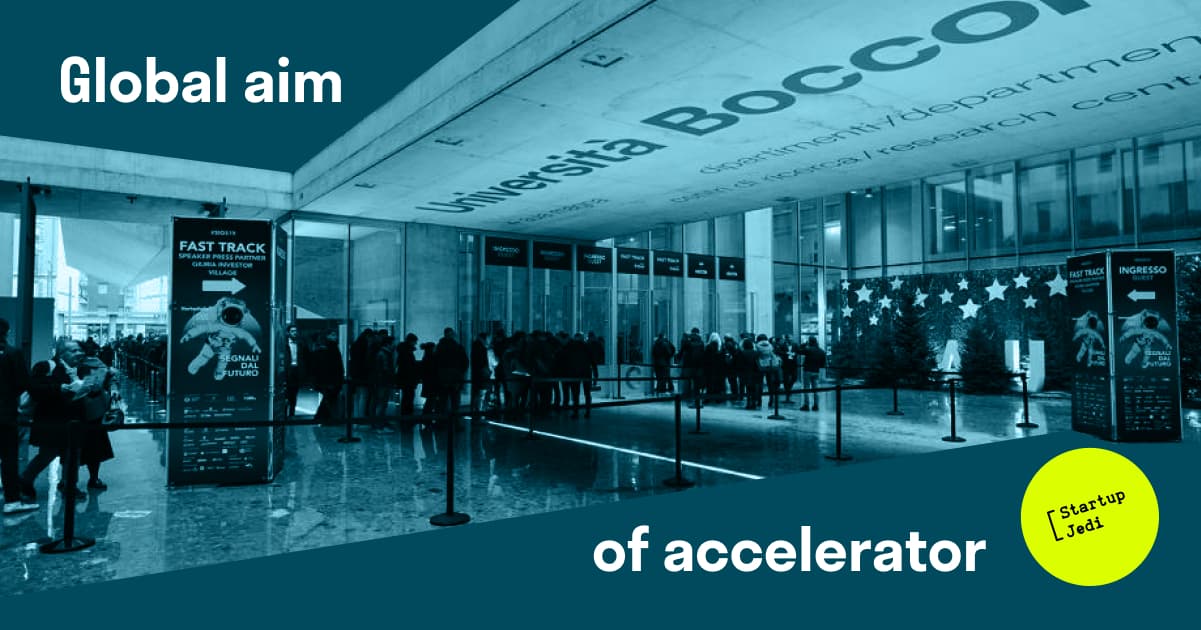
Startup Jedi
We talk to startups and investors, you get the value.
Bocconi is a private university, founded in Italy at the beginning of the last century. It is considered as one of the best educational institutions in the world in the sphere of economy, finance and jurisprudence. The professors of the university are CEOs of the largest Italian companies and business corporations of Goldman Sachs level. There is a business school at the premises of the university (which is also one of the four best in the world, according to Bloomberg), that launched pre-acceleration and acceleration programs earlier this year in order to develop entrepreneurship and implement innovations in corporations. Aleksander Komarevich, the program manager of Bocconi for innovations (B4i) accelerator, tells us how the university develops the startup ecosystem and favours implementing innovations in the country.

Startup Jedi
We talk to startups and investors, you get the value.
— Bocconi University is considered as one of the very progressive in Italy. Among the rectors of Bocconi University were the Italian Prime-minister and member of the board of directors at London Stock Exchange. An honourable President of Bocconi University has more than 60 years of experience: he has evaluated 300+ companies that are registered at the Stock Exchange, monetary institutions and institutional agencies.
All these people are famous specialists-practitioners, who due to various reasons are still close to the academic environment. Some just like it, while others have started their careers here and then just started their own businesses, but are still dedicated to their alma mater. This is the very reason why Bocconi expertise is so valuable.
Besides, Bocconi is famous for its networking. There is an opinion that studying at this university, gives graduates the possibility to open any doors in future.
Over the years, the university has been preparing future employees and top management of corporations. But in the past few years, the focus has shifted towards startups and corporate innovations. Therefore, the B4i accelerator appeared. The initiator of this project was the current rector Gianmario Verone (by the way, his track record includes the work of the chairman of the board of directors for innovation at Telecom Italia Mobile, a visiting professor at the Sloan School of Management at MIT). In June 2020, he was re-elected for the third time.
Other Italian universities also have incubation and acceleration programs. They develop either by the means of higher-education teaching personnel or along with private accelerators. One of the most famous university incubators is PoliHub of Milan Technical University, which is ranked among TOP-10 university incubators in the world.
...

The acceleration program contains three directions: “Digital technology”, “Made in Italy” and “Sustainable development”.
The subject matters of the “Made in Italy” track are fashion, design, food, beverages and furniture. All of these industries need innovations. For instance, there are more than 300 thousand companies where only 20 employees work. These businesses die because of the competition and the inability to enter other markets. Still, Made in Italy is a brand, which is one of the TOP-3 of the most famous and expensive in the world. Therefore, even such a simple idea as a marketplace for players in the shoe industry, which enables local manufacturers to find buyers from other countries, helps to introduce innovations at the industry level.
We’ve received many applications for “Made in Italy” track from startups that use virtual or augmented reality technologies in the fashion sector, and digitize the procedure for supplying products in the creative field. I especially remember a startup that collected data from open sources about what people wear and predicted future trends. In general, this case — when a startup takes data from open sources and makes a technical solution based on it — is one of the typical examples of how professionals from any industry can enter the digital sphere.
Each direction in the accelerator has its vertical manager. For example, Gabriella Loyakono, the director of the Executive Master in Luxury Management program, manages the “Made in Italy” program. The geography of this program covers such cities as Paris, Milan, Dubai, Singapore and Mumbai. In other words, Gabriella is a person with a unique network: she’s acquainted with all major players in the segment of luxurious products.
The term “Digital technology” covers a bit larger spectrum of services. Many ideas are repeated from year to year, taking an example of all possible platforms for delivering food and wine, social platforms, travel aggregators. But for Italy, it is still a hot topic. As there are many types of businesses in the country, which are not digitized.
We also had many applications from fintech startups: different robotic assistants, which help to forecast the best prices, etc. One of the projects that has gone through the acceleration, offers solutions for investment companies on the base of Artificial Intelligence. In particular, it enables creating high-performance investment products on the base of adjusting settings, which significantly decreases operating and staff costs.
“Technology for sustainable development” is the most difficult track. Quite often, solutions, which such kind of projects present, influence companies, brands or societies in perspective. In other words, it is impossible to reach high-performance indicators for such startups. Nevertheless, we’ve received many interesting applications. For example, one startup develops a brand new type of plastic, which can dissolve in the water. I also remember Mugoapp startup, which offers to measure the transaction index in e-commerce. Let’s have an example: you’ve bought apples in the store and paid with a card. The startup’s app assesses the environmental impact of your purchase (it’s no secret that various types of human activities affect the planet’s ecology in one way or another, this is called the “carbon footprint”. The harmfulness of food production is measured by the amount of carbon dioxide released into the atmosphere during the production of 100 grams of ready-to-eat food). If you take these apples by plane to Moscow, the level of carbon dioxide will change again. Thus, thanks to the application, you can know in real-time how you impact on the environment, and you can compensate for this — pay a few euros for the “damage” to one of the projects that are aimed at minimizing CO2 levels).
For this track, we selected one startup for the acceleration program and two for the pre-acceleration program. In 4 months we need to help them build a business. It’s not easy but inspiring, because 10 years ago we had no way to track where the products came from, whether the kilometre zero rule was observed, and did not even think about offsetting our carbon footprint. And now, thanks to this technology, it is possible. Many Italian schools and universities are developing programs aimed at reducing harmful emissions into the atmosphere, they are concerned about the state of the environment and climate change. A new generation is growing with new values, and they will develop completely new business concepts.
The manager of this track is Stefano Pogutc, who was a member of a scientific committee of the One Ocean Foundation organisation. She’s developing projects for private entities, organisations and companies, which aim to secure the sea flora and fauna. For instance, the first project has become Charta Smeralda — a document, which is developed to protect the ocean.
...

We received about 200 applications and we were stunned by the number of desirous. (According to the official statistics, there are 11 000 companies, which consider themselves innovative businesses. But this doesn’t mean that all of them are startups in the usual meaning of the word. In Italy, a company that develops a thematic website or marketplace is also considered as “innovational” — Startup Jedi)
When I was examining the applications, I couldn’t stop being astonished. A typical story: only three people work in a company. With this, one of them is Executive Director in Danone with working experience of 10 years or a top-manager of a famous pharmaceutical company. In such a way, the typical portrait of a founder is that he’s a Bocconi graduate, who is 20+ years old, and still many founders are 35–40 or even 50+ years old, they are working in corporations at quite prestigious positions.
I was also amazed by the fact that among potential participants of the batch, there were many people with sports accomplishments or children of successful entrepreneurs, top-managers of leading corporations in the country. Obviously, they wanted to become participants, not because of money given by the accelerator, but because of knowledge and contacts, which one could get here.
In general, we have selected five startups for the batch. According to our requirements, the team has to include two co-founders — by technical and business parts. They need to have the possibility to work full-time on the project in Milan and have an MVP. During quarantine, we shifted all processes and the program itself in the online-mode.

The acceleration program lasted four months and was divided into four micro blocks. The first one was only one week long. At this stage, we were conducting a business check: testing strong and weak sides of the startup, UX/UI of the product, juridical aspects. Thanks to this we found an understanding of how we can help the team in a short notice.
The next micro block was dedicated to the market and the product. At this point, we involved specialists, who could help the company to better understand the market and formulate hypotheses on how to enter that market. Also, teams learned how to correctly test their product and website. The experience has shown that it is important, even when the startup screwed up already.
The third block was about marketing and sales. At this stage, the team had to attract first clients and sell their product.
The final stage — fundraising. At this point, we focused on the development of a business plan and document preparation. Additionally, we scrutinized such questions as conducting negotiations, pitching investors, etc. And in grande finale — a Demo-day and a meeting with investors.
Everything was split into two-week sprints. Startups set goals for each period and after two weeks, they met with the accelerators’ team to discuss what has been done and what the new goals would be.
...

Endelea.it is an ethical fashion brand founded in Milan in 2018 to create clothing and accessories from African wax fabrics with Italian designs. The startup is reinvesting a portion of the proceeds in on-site training and funding collaboration between Italian and Tanzanian universities. In fact, it is the first Benefit Corporation in Italy in the fashion sector. The result of the acceleration is that the company sold out almost all of its collection (that is, sales growth almost 6 times), now it is preparing to produce a new one.
DoctorsinItaly is a digital platform that allows you to find a local English speaking doctor while traveling or living in Italy. Directly on the site, you can send a request and receive offers from the nearest doctors, choose the time and method of payment.
Duing is a platform for finding freelancers in communications, design, products and digital marketing. Helps create new digital content. The result of acceleration is that 2000 freelance specialists were registered, the first deals appeared on the site.
Qi4M is an AI-based investment strategy analysis application. Analyzes financial and economic data of companies and creates new investment products (neural networks are trained in different styles of investment strategies). The result of acceleration is that the investment algorithm has been improved, the metrics have been determined to reach the planned income for this year - € 500,000.
VIAMADEINITALY is the first platform in Italy to help Italian artisans and manufacturers find new wholesale buyers. VIAMADEINITALY's mission is to cover all the players and spheres that form the basis of Italian fashion and design: footwear, clothing, accessories, leather goods, furniture, etc. The result of the acceleration is an increase in MRR from € 5,000 to € 7,000.
...

In the previous accelerator where I used to work, out of 10 startups, one died, 6 reached the Demo-day. Of those left, two raised investments within the first 2 months. Others — within 12 months. The remaining two startups raised nothing at all. As a part of the current program at Bocconi, we intend to do our best. We want all startups to raise their investments within 12 months.
Besides knowledge and useful contacts, the accelerator gives startups 60 thousand euros (30 thousand in cash and 30 thousand in services provided) for a 5% company share. This is an investment of the university as a commercial institution. On the one hand, it is a standard deal. With this, some startups had a higher valuation: 2 million euros or 5 million euros. Thus, we had to negotiate and in solitary cases agree on a smaller share of the company. In perspective, we are planning to do follow-on investments.
Since a university is a non-profit organisation, it cannot get any income. Thus, we plan to create a side-institution, which will be financed by the university. And this institution will own startups’ shares. As for now, we are registering a venture fund for these purposes. And as this is a first of its kind fund in Italy, we face some difficulties.
Apart from that, we plan to establish connections to integrate the startup ecosystem: with a few universities in Milan, a research institute, Plug and Play acceleration program and, of course, Italian venture funds and business angels.
Facebook: facebook.com/StartupJedi/
Telegram: t.me/Startup_Jedi
Twitter: twitter.com/startup_jedi
Comments